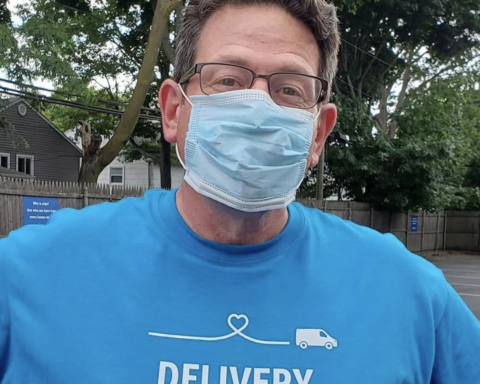CAMARILLO, CA— I sit across the table from one of our regular caregivers. We have two; one for the weekdays, and one for the weekends. Our weekday caregiver, Lillian, has had a day full of putting puzzles together, going along with whatever gibberish my grandfather might say, sorting pills, cooking and cleaning—overall being a companion and helper for both of my grandparents. It’s a Tuesday afternoon.
Dominos scatter one side of the table, and my grandfather with stage seven of Alzheimer’s sits on the other side, nonchalantly popping popcorn in his mouth. Lillian has been working in the caregiving industry for about 16 years, and tells me her passion of caring for others began with caring for her own family members. She now works out of an agency that provides in-home caregiving for the elderly. Lillian has a great presence—she’s honest and funny, and always eager to find ways of engaging my grandparents. Knowing that her clients are at a much higher risk and vulnerability of dying from the coronavirus, Lillian told me about how the virus has affected her job. “There’s an added stress element because you’re worrying more about who you’re taking care of, and making sure that they don’t get sick,” she said. “The last thing you want to do is get them sick.” The invisibility of the virus is one of the scariest things of all. Being unable to tell whether someone is sick for two weeks makes the whole situation that much more precarious. If a caregiver contracts the virus, it poses a very high risk of their clients getting infected. Despite the severity of the risks, both Lillian and Emma, the weekend caregiver, expressed the lack of support from their agencies with the pandemic. “This time more than ever, the company lacks the willingness to supply all the workers with the things they need to be safe,” Emma stated. Emma is very easy-going, positive, and truly enjoys her job. She’s been working in the business for six years, and enjoys talking to and learning about the experiences of her clients. Recently, she’s been frustrated with the way her agency has handled the pandemic. “My agency has called once and sent a few emails and links,” Emma said. “They didn’t give me anything besides a wad of gloves they stuck in an envelope. But no masks, nothing.” Lillian shared similar frustrations. “There wasn’t much support for our fears,” said Lillian, adding that the caregivers received one email at the end of March. “It didn’t feel like there was a place to go for any questions we had—the email was basically just telling us to stay away from other people.” The combination of families being unable to travel at this time and the dangers of having someone visit the homes of the elderly causes some families to be without care. Deciding whether or not to continue care is a difficult decision for families to make. A family in need of care voiced their own struggle with this. “My mother in law wants care, but she has to wait until all of this is over. She’s too afraid to even have somebody in the house right now,” says Danica, a mother of three, from New Jersey. Contrary to Danica’s family’s decision, my family is continuing care. My mother explained the overall importance of having caregivers around. “At the end of the day you have to take the calculated risk. You have to ask yourself, is the risk worth the benefit?” my mom said. My family has had to be very thorough in deciding on the continuation of care with the caregivers. “We felt we had a good understanding of each caregiver’s approach to the virus—their own self protection, their lifestyle outside of work, and their acceptance of the seriousness of the pandemic. Not just for us, but for themselves too,” my mother explained. Allowing someone to visit your home every day without knowing exactly where they’ve been or what they’ve been exposed to is nerve-wracking.
The reliance that the elderly have on their care providers increases the pressure on their family and caregiving agencies. For my family, our biggest concern is the virus affecting our whole network of care. If one of my parents gets it, they leave me, my sister, and our grandparents behind. “The way that it’s scary to me is not about it affecting my parents. Given their age, we’re already dealing with Caregivers have more work now than ever. The added anxiety, changes in familiar regime, and constant hyper-awareness can wear them out. Our weekend caregiver especially feels this. “It’s a little draining mentally. I’m expending more energy being aware of everything that’s going on. A lot of the other caregivers I’ve talked to lately have felt tired and ‘zapped,’” she shared. “Normally I try to keep my hours around 30 in a week… but since quarantine, I’ve been working closer to forty,” said Emma. The increased number of hours is due to clients being unable to do tasks on their own- going to any public place is a risk, so they need extra help from caregivers. In addition to this, caregivers must take extra steps to make sure they are being as little risk to their clients as possible- such as extra cleaning and preparation. For example:“It’s a little draining mentally. I’m expending more energy being aware of everything that’s going on. A lot of the other caregivers I’ve talked to lately have felt tired and ‘zapped,’” she shared. “Normally I try to keep my hours around 30 in a week… but since quarantine, I’ve been working closer to forty,” said Emma. Indeed, clients are more dependent on them than ever to shop, etc. Not to mention the extra steps they need to now take to prepare and clean as they must take to make sure that they pose as little risk to their clients as possible.. In-home caregiving agencies have had to act quickly in order to inform their employees, with little knowledge on how to navigate the situation themselves. Shortages of supplies also make it difficult to ensure that caregivers and their clients are safe. The stakes are already high as it is for these agencies—these caregivers are vital to the lives of many people. But now, with the added stress and uncertainty of the virus, the pressure is really on for them. Many caregivers have even ceased working. An in-home caregiving agency local to my area has lost caregivers since the pandemic. “Some of them stopped working because they don’t feel safe going to different houses,” the brother of the manager told me.
This caregiving agency is fairly new, and is run by a family that also owns a Filipino grocery store nearby my house. They have taken many precautions in order to keep their clients safe, such as limiting the caregivers to one patient—rather than working for multiple households at a time. All medical workers, whether they work in emergency rooms or in people’s living rooms, face mortality on a level many of us don’t. For me, mortality sits just across the table—barely beyond the food that brings three generations of my family together every night. The threat of the coronavirus now has a seat at the head of the table. For my grandfather, though… he’s happy munching on his popcorn.








A wonderful insightful piece about the complexities families and home health workers face in these pandemic times.